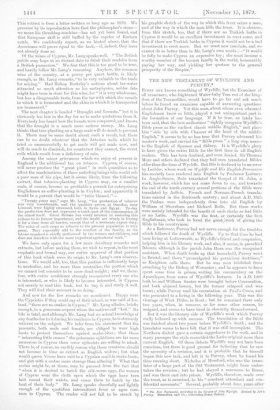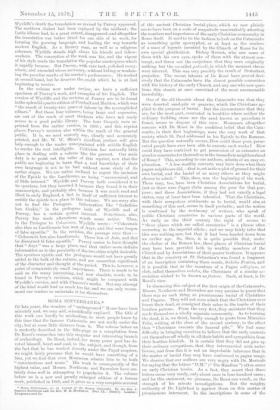THE NEW TESTAMENT OF WYCLIFFE AND PURVEY. *
EVERY ONE knows something of Wycliffe, but the Examiner of all examiners, who frightened Water-baby Tom out of the king- dom of the Tomnoddies, would have to go far and ask much before he found an examinee capable of answering questions about John Purvey. Yet this man, about whom even educated Englishmen know so little, played a not unimportant part in
ge. If it be true, as lately has.
the formation of our langua
been said, that the best authorities "rightly recognise Wycliffe's Bible prose as the earliest classic middle English," and place him "side by side with Chaucer at the bead of the middle. English," it seems to be no loss true that Purvey advanced his, master's work, and carried his "Bible prose" a long step nearer to the English of Spenser and Sidney. It is Wycliffe's glory. to have given the entire Bible for the first time to all English readers. This has been doubted, and even denied. Sir Thomas More and others declared that they had seen translated Biblea older than the time of Wycliffe. But this is declared to be an error. by Lechler, whose work on 'Wycliffe and His English Precureors.. has recently been rendered into English by Professor Lorimer. In Anglo-Saxon, Bede translated the Gospel of St. John, a; work, however, which has not come down to us ; and towards. the end of the tenth century several portions of the Bible were translated by Aelfric. French and Norman-French trail:11a- tions existed in the thirteenth century ; and about A.D. 1325- the Psalms were independently done into old English by William of Shoreham and Richard Rolle. But these works- were mainly intended for the benefit of such clerks as had little or no Latin. Wycliffe was the first, or certainly the first. Englishman, who took in hand the greaVvvork of giving the. Bible to his countrymen.
As a Reformer, Purvey had not nerve enough for the troubles, which followed the death of Wycliffe. Up to that time he had_ been living at Latterworth, as Wycliffe's friend and companion,. helping him in his literary work, and also, it seems, in parochial Nbours, although in the parish John Horn was the recognised. assistant. When death broke up that household, Purvey went to Bristol, and there "promulgated his pernicious doctrines,"' as Knighton calls them. But he was soon inhibited from preaching by the Bishop of Worcester ; and he appears to have spent some time in prison, writing his commentary on the Apocalypse, from notes of Wycliffe's lectures. In A.D. 1400' both ho and William Sautre were brought before Convocation, and both abjured heresy, but the former relapsed and was. burnt ; while Purvey read his recantation at Paul's Cross, and was presented to a living in the following year. This was the vicarage of West lithe, in Kent ; but he remained there only two years, when, in remorse, or for some other reason, he resigned, and seems to have lived in obscurity thenceforward.
But it was the literary side of Wycliffe's work which Purvey really followed up with success. The translation of the Bible was finished about two years before Wycliffe's death ; and the translator seems to have felt that it was still incomplete. The Northern dialect gave a certain ruggedness to the work, and in many passages the style resembled the Latin original more than current English. Of these defects Wycliffe may not have been conscious, but there is good ground for believing that he saw the necessity of a revision, and it is probable that he himself began this new task, and left it to Purvey, when he found his time running short. Nicholas of Hereford, who was the trans-
lator of a large part of the Old Testament, might have under-- taken the revision ; but he had obeyed a summons to Rome, and was there cast into prison. Wycliffe, therefore, made over the trust, as is surmised, to his "constant attendant and con- fidential messmate." Several, probably about four, years after
* The New Testament, according to the Version of John trove. Reviled Si,, John, Purvey. Macmillan and Co.; Clarendon Frees, Oxford.
Wycliffe's death the translation as revised by Purvey appeared. The northern dialect had been replaced by the midland ; the Latin idioms had, to a great extent, disappeared, and altogether
the translation was better fitted for one side of its work, for forming the growing language, and leading the way towards
modern English. As a literary man, as well as a religious reformer, Wycliffe stands high above his friends and fellow- workers. The conception of the work was his, and the vigour of his style made the translation the popular masterpiece which it rapidly became. But Purvey, with rare tact, polished every- where, and ainended where necessary, without hiding or weaken- ing the peculiar merits of his master's performance. He worked at second-hand, but he deserves the credit which he is at last beginning to receive.
In the volume no under review, we have a sufficient specimen of Purvey's work, and examples of his English. The version of Wycliffe and the revision of Purvey are to be found in the splendid quarto edition of Forshall and Madden, which was "the result of twenty-two years of labour by the accomplished editors." But these four volumes, being large and expensive, are out of the reach of most students who have not ready access to a good public library. The four Gospels were re- printed from the earlier version, in 1.865 ; and this reprint places Purvey's revision also within the reach of the general public. It is, we need scarcely say, clearly and accurately printed, and Mr. W. W. Skeat's excellent preface will give help enough to the reader unacquainted with middle English to render the text intelligible. Criticism has naturally little place in dealing with a volume like the present. Our main duty is to point out the value of this reprint, now that the public are beginning to learn that a. real knowledge of their own language is not to be had without some study of its earlier stages. We are rather inclined to regret the omission of the Epistle to the Laodiceaus, as being " nueanonical, and of little interest." Wycliffe and Purvey both considered it to be spurious, but they inserted it because they found it in their manuscripts, and probably also because it was much read and liked in early England, a fact in itself of sufficient interest to entitle the epistle to a place in this volume. We are sorry also not to find the Prologues. Information like " Galathies ben Grekis," in the prologues both of Wycliffe and of Purvey, has a certain quaint interest. Sometimes, also, Purvey has made alterations worth some notice. Thus, in the Prologue to Coinssialts, Wycliffe wrote :—" Colocensis also thee as Laodicensis ben men of Asye, and thei were forgon of false apostlis." In the revision, the passage runs thus :— " Colocensis ben also Laodicensis. These ben of Asia, and thei be disseyued hi false apostlia." Purvey seems to have thought that " Asye " was a large place, and that rather more definite information as to the proximity of the two cities might desirable. The spurious epistle and the prologues would not have greatly added to the bulk of the volume, and are somewhat significant of the character and thought of the period. This is, however, a point of comparatively small importance. There is much to be said on the many interesting, and now obsolete, words to be found in Purvey's revision, which might be compared with Wycliffe's version, and with Chaucer's works. But any attempt of the kind would lead us much too far, and we can only recom- mend our readers to undertake it for themselves.



































 Previous page
Previous page